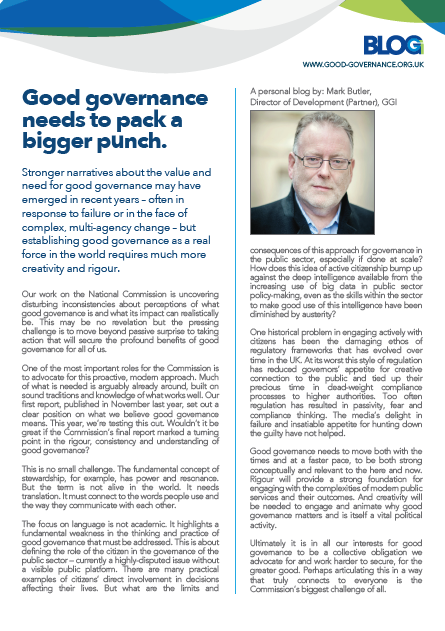Good governance needs to pack a bigger punch
20 January 2020

Stronger narratives about the value and need for good governance may have emerged in recent years – often in response to failure or in the face of complex, multi-agency change – but establishing good governance as a real force in the world requires much more creativity and rigour.
Our work on the National Commission is uncovering disturbing inconsistencies about perceptions of what good governance is and what its impact can realistically be. This may be no revelation but the pressing challenge is to move beyond passive surprise to taking action that will secure the profound benefits of good governance for all of us.
One of the most important roles for the Commission is to advocate for this proactive, modern approach. Much of what is needed is arguably already around, built on sound traditions and knowledge of what works well. Our first report, published in November last year, set out a clear position on what we believe good governance means. This year, we’re testing this out. Wouldn’t it be great if the Commission’s final report marked a turning point in the rigour, consistency and understanding of good governance?
This is no small challenge. The fundamental concept of stewardship, for example, has power and resonance. But the term is not alive in the world. It needs translation. It must connect to the words people use and the way they communicate with each other.
The focus on language is not academic. It highlights a fundamental weakness in the thinking and practice of good governance that must be addressed. This is about defining the role of the citizen in the governance of the public sector – currently a highly-disputed issue without a visible public platform. There are many practical examples of citizens’ direct involvement in decisions affecting their lives. But what are the limits and consequences of this approach for governance in the public sector, especially if done at scale? How does this idea of active citizenship bump up against the deep intelligence available from the increasing use of big data in public sector policy-making, even as the skills within the sector to make good use of this intelligence have been diminished by austerity?
One historical problem in engaging actively with citizens has been the damaging ethos of regulatory frameworks that has evolved over time in the UK. At its worst this style of regulation has reduced governors’ appetite for creative connection to the public and tied up their precious time in dead-weight compliance processes to higher authorities. Too often regulation has resulted in passivity, fear and compliance thinking. The media’s delight in failure and insatiable appetite for hunting down the guilty have not helped.
Good governance needs to move both with the times and at a faster pace, to be both strong conceptually and relevant to the here and now. Rigour will provide a strong foundation for engaging with the complexities of modern public services and their outcomes. And creativity will be needed to engage and animate why good governance matters and is itself a vital political activity.
Ultimately it is in all our interests for good governance to be a collective obligation we advocate for and work harder to secure, for the greater good. Perhaps articulating this in a way that truly connects to everyone is the Commission’s biggest challenge of all.

